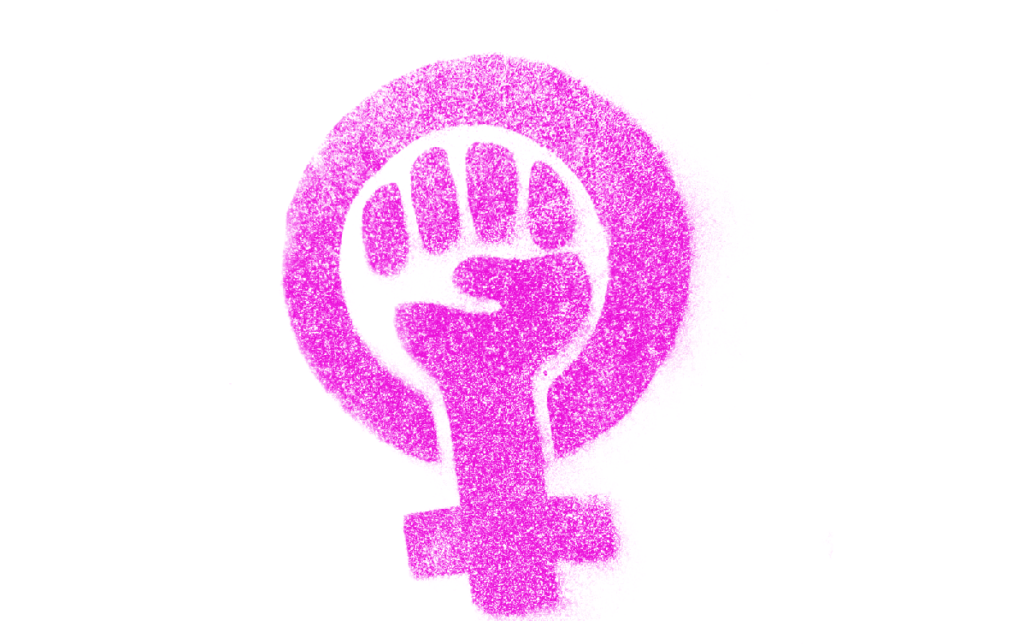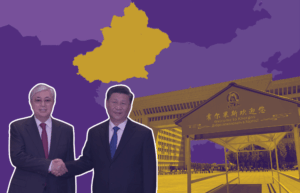On 8 March, hundreds of protesters walked the 5km length of Shevchenko Street, a major street in Almaty, Kazahstan’s largest city, and the police looked on. This celebration of International Women’s Day is a first in Kazakhstan but the reaction from members of the ruling party Nur Otan shows change is slow coming.
International Women’s Day in Kazakhstan traditionally involves men bringing home fresh flower bouquets and presents to celebrate their loved ones. However, in 2021 the day marked a first: for the first time in the modern history of the country, the local government in Almaty, Kazakhstan’s largest city, authorised a march organised by several feminist collectives.
On 8 March, hundreds of women walked the 5km along Shevchenko Street, one of the main streets in the city centre. Activists of all ages and genders carried banners emblazoned with slogans such as “Stop domestic violence” and “Women want to be safe”, Radio Freedom Europe / Radio Liberty reported. The crowd demanded equality and respect for women and LGBTQ+ people, the criminalisation of domestic violence and measures to make wages equal.
In response, on 31 March, Bekbolat Tleuhan, a deputy of the Majilis (Parliament), has asked the government to consider the march and the demands of the protestors as “an attack on spiritual values,” the Almaty-based outlet Vlast reports. In a parliamentary request addressed to Deputy Prime Minister Eraly Toǵjanov, he questioned the legality of the march and proposed a bill to ban same-sex marriage.
A peaceful march
The first picket took place at Gandhi Park, in the city centre, with over 500 people turning up. As it was occurring amidst the pandemic, every participant wore a mask. The march ended around 5km away, by the Academy of Sciences, where organisers and participants spoke to an orderly crowd from a safe distance, respecting social distancing.
The speakers included the activist Irina Pukhnatova, popularly known as Arina Osinovskaya, who in 2020 was arrested on International Women’s Day alongside another feminist campaigner, Fariza Ospan, for “petty hooliganism”. She told the crowd: “We want this to be a historic day in Kazakhstan, the first of many more marches on this day of struggle…that was our promise during the march last year, we delivered this year, and we hope to keep the promise in the future.”
Read more: Uzbekistan: when women demand to have a voice
The feminist collectives involved in organising the day included KazFem, Feminita, FemAgora, FemSreda and SVET. The police was present but did not intervene and no participants were detained or arrested, Human Rights Watch’s Vika Kim writes.
Since former president Nursultan Nazarbaev stepped down in 2019, smaller protests, such as the anti-government protests that year, have encountered police aggression and mass arrests. One possibility is that the police had to be on their best behaviour due to recent international backlash against the Kazakh government for severe charges against multiple human rights activists and NGOs.
Why is this unprecedented?
This is the first time a feminist march of this size has been authorised to take place in modern Kazakhstan. Last year, around 200 activists gathered but the rally was unauthorised. In 2017, only around two dozen activists marched.
One of the orchestrating feminist groups of this year’s march, FemAgora, set up a festival in 2018 to raise awareness for gender and LGBTQ+ equality which celebrated its third anniversary in 2021. Every year, women in Kazakhstan feel increasingly encouraged and empowered to march for their rights and demand equality. Aery Asiyeva, a member of KazFem, deemed the rally to be a success: “We worked for months to organise the biggest feminist march in Kazakhstan’s history. We were pushed back by nationalists and right-wing traditional groups, but the support we received from donations and volunteers was our strength.”
Women still struggle for equality
Domestic violence and sexual abuse are still widespread across the country, with 17% of women between the ages of 18 and 75 suffering physical or sexual abuse from a partner, and 21% experiencing psychological abuse, according to a 2018 study.
The public foundation Don’t Be Quiet (NeMolchiKZ) says that every day an average of eight women and two children are raped in Kazakhstan. 400 women are killed in Kazakhstan every year in domestic violence.
There remains in Kazakhstan a tradition of oppression through cultural stigma and the pressure to conform to social norms often leaves victims scared or embarrassed to seek justice. The Kazakh word “uyat” (ұят) translates to ‘shame’ in English but is often used to refer to the guilt imposed over women that justifies their oppression. Women are often blamed for their abuse, for example for ‘leading on’ their abusers. Thus, many cases of violence often go unreported, so the figures shown are probably lower than in reality.
Read more: The Wife: the short film highlighting domestic violence in Kazakhstan
Women are not being adequately protected by the law and do not have access to justice. In July 2017, the sanction against physical violence on women was changed from being a criminal offence to just an administrative offence.
In January of this year, President Qassym-Jomart Toqaev signed a law punishing violence against family members with a written warning, despite stating in his first address to the nation that Kazakhstan “urgently needs to tighten the penalties for sexual violence… and domestic violence against women.”
According to Human Rights Watch, Kazakh authorities and police often encourage women to drop complaints and reconcile with their abusers and withhold information such as the right to seek shelter and protection orders. This means that men are not receiving education to improve their behaviour or being held accountable which only perpetuates the cycle of violence.
Increased representation
The theme for International Women’s Day 2021 created by the United Nations Development Programme was “Women in Leadership: Achieving an equal future in a COVID-19 world”, to highlight the efforts by women and girls to shape a more equal future whilst recovering from the pandemic. Kazakhstan was celebrated for having increased female representation in company management with participation from the state, and for introducing gender and youth quotas for the list of candidates to the Majilis and Maslihats (municipal assemblies).
The country has also been credited with taking a proactive role in the Generation Equality Forum where it plans to take part in two action coalitions on gender-based violence and economic justice and rights, according to the UN’s joint statement published on 6 March.
Lily Shanagher
Novastan.org
For more news and analysis from Central Asia, follow us on Twitter, Facebook, Telegram, Linkedin or Instagram.
 Kazakhstan: does official backlash loom after historic International Women’s Day?
Kazakhstan: does official backlash loom after historic International Women’s Day? 



